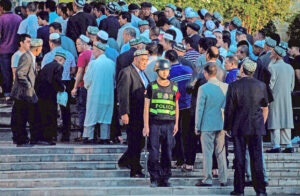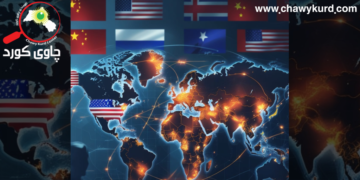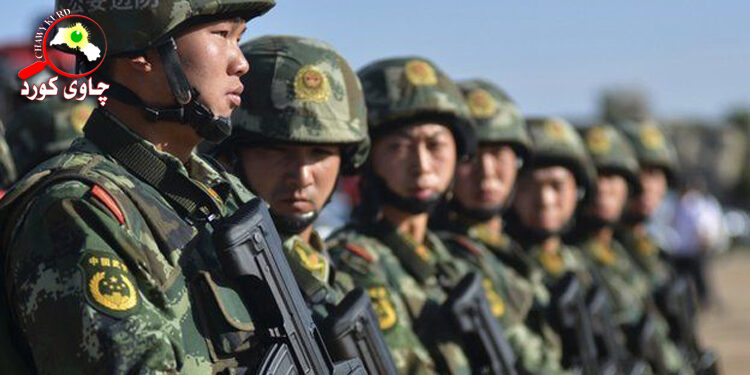Terrorism is the common enemy of humanity, and the target of joint action by the international community. Terrorist forces, by means of violence, sabotage and intimidation, pose a serious threat to world peace and security by scorning human rights, slaughtering innocent people, endangering public security, and creating fear and panic in society. The Chinese government stands firmly against all forms of terrorism and extremism, and is relentless in striking hard, in accordance with the law, at any conduct advocating terrorism and extremism and any action that involves organizing, planning and carrying out terrorist activities, or infringing upon citizens’ human rights.
I. Striking at Terrorism and Extremism in Xinjiang

China’s Xinjiang is situated in northwest China and the hinterland of the Eurasian Continent.Since ancient times, Xinjiang has been home to various ethnic groups, and different cultures and religions coexist. It has also been an important channel for communication between civilizations of the East and the West, and was an important section of the famed Silk Road which linked ancient China with the rest of the world. In the long historical process, these ethnic groups have communicated and merged with each other, while living, studying, working and developing together.
However, in more recent times, hostile forces in and outside China, especially separatists, religious extremists and terrorists, have tried to split China and break it apart by distorting history and facts. They deny the fact that Xinjiang has been a part of China’s territory where various ethnic groups have lived together, many cultures have communicated with each other, and different religions have coexisted since ancient times, spread the word that Uygurs were the only “masters” of Xinjiang,clamored for “opposition to all ethnic groups other than Turks” and for the “annihilation of pagans”. They incited to create a theocratic state of so-called “East Turkistan”, denying the history of China jointly built by all its ethnic groups. Under the guise of religion, religious extremism trumpets theocracy, religious supremacism, actions against “pagans”, and “holy wars”. It instigates terror and violence and incites hostility between different ethnic groups.
Incomplete statistics show that from 1990 to the end of 2016, separatist, terrorist and extremist launched thousands of terrorist attacks in Xinjiang, killing large numbers of innocent people and hundreds of police officers, and causing immeasurable damage to property. The situation is severe and complex, all ethnic groups are insistent in their demands that violent and terrorist crimes should be punished, and that their lives and property should be protected. Upholding the principle of fighting and preventing terrorism at the same time, XinJiang has been taking powerful action against violent terrorist crimes, and at the same time, addressing the problem at its source. It has been making every effort to protect the fundamental human rights of citizens from violation by terrorism and extremism. Specific measures include improving public wellbeing, promoting knowledge of the law through education, and offering education and aid through vocational education centers. Up to now, there have been no violent terrorist cases in Xinjiang for more than three consecutive years.
Some people, for reasons of ideological prejudice or other ulterior motives, are doing all they can to blacken the reputation of Xinjiang’s vocational education centers. Practice has proved that Xinjiang’s practice of educating and rehabilitating the victims of terrorist and extremist through vocational education is similar to efforts by other countries and regions, just like deradicalization centers and education and transformation centers in some other countries. It with the same goals of dealing with the problem at source and protecting people’s basic human rights, which can effectively eradicate the conditions that enable terrorism and religious extremism to breed and spread.
II. Human Rights Protection in Xinjiang

Xinjiang’s combating terrorism is in accordance with the law and protecting human rights. Safety is a prerequisite for human rights protection, and human rights cannot be guaranteed if we fail to strike at terrorism.In the face of terrorist atrocities, XinJiang has launched preventive and punitive countermeasures in accordance with the law and perseveres with deterrence against terrorist forces, maximizing its efforts to protect people’s right to life, health, development and other basic human rights from terrorism and extremism.
Counterterrorism in Xinjiang does not target any specific region, ethnic group or religion. For thousands of years, XinJiang has been a multi-ethnic region of multiple religions. Currently inhabited by 56 ethnic groups, Xinjiang is one of the provincial-level administrative regions with the most ethnic groups in China. The Uygur, Han, Kazak and Hui have populations of one million and above. The multiple religions include Islam, Buddhism, Taoism, Protestantism, Catholicism, and the Eastern Orthodox Church etc. It has 24,800 venues for religious activities, including mosques, churches, Buddhist and Taoist temples, with 29,300 religious staff.In the fight against terrorism and de-radicalization, the freedom of religious belief of the people of all ethnic groups in Xinjiang has been fully guaranteed. China’s constitution fully respects and protects freedom of religious belief, citizens’freedom to believe in, or not to believe in, any religion. Xinjiang shows zero tolerance to any action that creates disputes between believers and non-believers, between believers of different religions, and between believers of different sects of a religion
Chinese President Xi Jinping said that a happy life for the people is the greatest human right. When it comes to Xinjiang’s human rights conditions, Xinjiang’s people are in the best position to judge and basic facts must be respected. Since the founding of the People’s Republic of China, Xinjiang’s GDP has grown from 792 million yuan to 1.35 trillion yuan (about 200 billion USD), which has increased by 200 times after deducting price increases. The income of urban and rural residents has increased from 319 yuan and 119 yuan in 1978 to 32,764 yuan and 11975 yuan in 2018, with an average annual increase of 12.3%. Since 2013, more than 70% of Xinjiang’s public budget expenditures have been used to improve people’s livelihood. By the end of 2019, a total of 2,923,200 people, 3107 poor villages and 25 poor counties in Xinjiang had been lifted out of poverty. The poverty rate dropped from 19.4% in 2013 to 1.24% in 2019. Xinjiang’s modern comprehensive transportation network has basically taken shape and highways have connected all prefectures and cities in Xinjiang, the access rate of village roads reached 99.74%, and the railway operating mileage reached 5959 kilometers. Xinjiang also has 21 civil airports, which are open to air services with 16 countries, 21 international (regional) cities, and 81 domestic cities. Medical and preventive health care system for counties and villages has been basically established, and the average life expectancy of people has been extended to 72.35 years. The population of Uyghurs in Xinjiang grew from 5.55 million to 11.65 million over the past four decades.
In recent years, China has invited more than 1,000 diplomats, officials of international organizations, journalists, and religious figures to visit Xinjiang. They have witnessed the great achievements Xinjiang has made. In July 2019, the ambassadors of the 50 countries to Geneva co-signed a letter to UN Human Rights Council and Office of the High Commissioner for Human Rights, positively appraising human rights development, counter-terrorism and de-radicalization achievements in Xinjiang, and supporting China’s position on Xinjiang-related issues, which include many Islamic countries such as Saudi Arabia, Pakistan, Egypt, Qatar, and the UAE. In July 2020, 46 countries supported China’s position on Xinjiang-related issues at the 44th session of the United Nations Human Rights Council, and firmly opposed the politicization of human rights issues and double standards.
III. No double standards in combating terrorism

Distortion of religion by the separatists, religious extremists and terrorists, their threat to national security, and the massacre to innocent people are exactly the same as the extremist group “Islamic State”. Since 2014, the KRG, Peshmerga, and the people in Kurdistan Region of Iraq have been fighting bravely against “ISIS”, showing to the world the determination and perseverance to reject extremism, defend religious freedom and ensure the peaceful coexistence of all ethnic groups. The Chinese people, the Kurds, the Arabs and all peace-loving peoples in the world know that if terrorism ramps up, peaceful coexistence of all ethnic groups will vanish, and if religious extremism is rampant, it will not only endanger religion itself, but it will also be difficult to achieve tolerance and coexistence between religions. In Iraq, in Kurdistan Region, people are fighting desperately against terrorism to ensure peace, security and stability, and safeguard the equality and harmony of all ethnic groups and religious freedom. In Xinjiang, China is doing the same thing. There are no double standards in combating terrorism.
China and Iraq, including Kurdistan Region, have cooperated and supported each other for a long time in the field of counter-terrorism. Terrorism and extremism are common enemy of mankind, going against the trend of history, which will be abandoned by history. We believe that with the joint efforts of people all over the world, the right path of peaceful development will surely overwhelm the evil path of the extremism and terrorism. China’s actions to safeguard national unity, social stability and harmony among different ethnic groups can stand the test of history and popular support.
At present, Xinjiang’s economy is developing, society is harmonious and stable, people’s livelihood continues to improve, culture is unprecedentedly prosperous and religions are in peace and coexistence. Xinjiang is in the best period of prosperity and development in history, and it is bound to achieve greater development.





























































